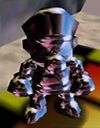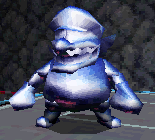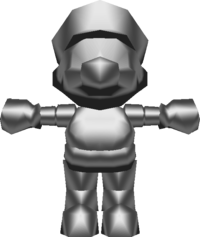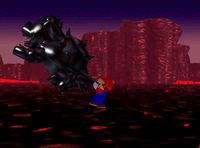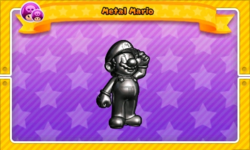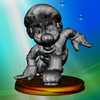Metal Mario (form)
- This article is about the metal state that Mario and various other characters can transform into. For the independent Metal Mario character, see Metal Mario (character). For the Metal Luigi character appearing in Super Smash Bros. Melee, see Metal Luigi.
Template:Form-infobox Template:Quote2 Metal Mario (called Metal Power in Super Mario 64 DS[1]) is a powered up form of Mario that first appeared in the game Super Mario 64. Metal Mario is tougher, stronger, virtually invincible, and can be hurt only by long falls. This form is acquired by picking up the Metal Cap from green ! Blocks, with the use of a Metal Box or a Metal Mushroom Orb.
The Metal form is later granted to other characters, though the form itself acts the same.
History
Super Mario series
Super Mario 64
When Mario first encounters the Metal Cap in Cavern of the Metal Cap in Super Mario 64, he becomes Metal Mario. In this form, Mario is invincible (although he can still take falling damage) and can destroy enemies just by running into them. Metal Mario is also very heavy, and as such, can withstand strong winds, underwater currents, and can walk on the bottom of bodies of water. In addition, he does not need to breathe, meaning he can stay underwater without worrying about air until the metal power runs out. Despite being heavy, Metal Mario still retains all his physical speed as well his athletic jumping abilities, but sinks in quicksand faster.
Metal Mario can combine his Metal Cap with the Vanish Cap to become Vanish Metal Mario, which will enable him to go through certain walls while maintaining his metal form's strengths and weaknesses.
The music that plays when the player is Metal Mario is an arrangement of the Starman's theme from Super Mario Bros. Metal Mario's reflection texture is actually a fisheye photo of a garden.[2]
Super Mario 64 DS
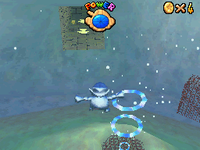
In the remake of Super Mario 64 for the Nintendo DS, Super Mario 64 DS, only Wario could turn metallic and become Metal Wario by using a Power Flower. He is able to walk on lava and freezing water, though after a while he begins to sink, and if he goes below the surface, he will lose a life, similar to the slower quicksand. Metal Wario's other abilities and vulnerabilities are the same as Metal Mario's.
The Mega Mario and Fire Power themes from Super Mario 64 DS are arrangements of Metal Mario's theme music.
Super Mario Odyssey
In Super Mario Odyssey, a cap and outfit based on the Metal form's Super Mario 64 appearance (named the Metal Mario Cap and the Metal Mario Suit respectively) can be purchased from Crazy Cap stores. The outfit costs 2000 coins and is available after 540 Power Moons have been collected, and the cap costs 1000 coins and is available after 560 Power Moons have been collected. Aside from allowing Mario to enter a specific area in the Mushroom Kingdom, this outfit is aesthetic and serves no other gameplay advantage. Clanking can be heard as Mario walks in the outfit, and Cappy makes an audible clink if he hits a wall when thrown. The description for the Metal Mario Suit implies that Metal Mario is specifically made out of aluminium.
Dr. Mario 64
At the end of Wario's story in Dr. Mario 64 (after winning every match without losing once), Dr. Mario accidentally eats some Megavitamins and takes on a Metal form. This metallic Dr. Mario faces off against Wario in a final battle. Once he is beaten, he can be used in multiplayer as a separate playable character.
Super Smash Bros. series
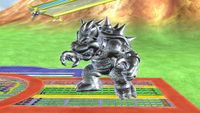
A Metal Mario character appears in the original Super Smash Bros. as a boss. The sequel, Super Smash Bros. Melee, also featured this permanently metal alter-ego of Mario as well as a separate Luigi character as bosses in Adventure Mode. The trophy of Metal Mario in Super Smash Bros. Melee uses the Yoshi's Island stage as its reflection.
As of Super Smash Bros. Melee, players can pick up the Metal Box as an item, and gain metal forms for a limited time, all boasting the same attributes as the non-playable Metal Mario: namely, being heavier (i.e. their jumping height is lower and falling speed is faster) and silent, except for clanging metal noises made when they move. This metal form can also be used as a setting in Special Brawl of Super Smash Bros. Brawl and in Special Smash in Super Smash Bros. for Wii U, where it is permanent, just like the boss. Anyone who turns into a metal form loses their voice, with their movements and other sound being accompanied by metallic sound effects. An exception to this is Sonic the Hedgehog, who does not have his voice changed when he initiates his Final Smash.
In Classic Mode of Super Smash Bros. Melee and Super Smash Bros. Brawl, a random character in a permanent metal form will always be one of the selected challengers. In Melee, this metal character will always appear at Level 10, whereas in Brawl, one will appear at random anywhere from Levels 6 to 10. In Super Smash Bros. for Wii U, when the player chooses a battle in the first five rounds, one or more opponents might suddenly be replaced by an intruder, marked by a glowing yellow trophy base, even in a team battle. Intruders are always in a permanent Giant or Metal state, but are guaranteed to be carrying a prize of some kind for victory.
Additionally, the Metal Box is also available as a red item in Smash Tour, giving players the ability to start a battle in metal form.
Crazy Orders may also feature a Metal Battle as a potential order option.
In Smash Run of Super Smash Bros. for Nintendo 3DS, alongside the Fighting Mii Team, normal-sized and giant Metal versions of the player's character may appear in the game's Multi-Man Smash Final Battle as opponents.
Mario Party series
Metal Bowser appears in Mario Party 2 after playing a game on Bowser Land, where the winner heads to fight Bowser but when the character grabs his tail, he transforms into Metal Bowser and it will be impossible to lift him. To deal with this, Toad offers a Power Star to give more power to the winner and thus, Metal Bowser is swung and thrown around the world. Crash-landing, Bowser's metal form is shattered to pieces, reverting him to his normal form.
The metal form also appears in Mario Party 6 and Mario Party 7 when one of the playable characters uses a Metal Mushroom Orb on themselves to avoid traps. Also, when a player gets a Cursed Mushroom Panel, Bowser makes a brief reference to Metal Mario, by saying, "Answer quickly or your bonus points will fall like a Metal Mario off an airship!"
Puzzle & Dragons: Super Mario Bros. Edition
Metal Mario appears in Puzzle & Dragons: Super Mario Bros. Edition as a Leader, available with the game's digital update to version 2.0, unlocked after earning an S rank or higher in Course 3 of the Fixed Challenges in Score Attack. Metal Mario is a Dark/Dark attribute teammate with an HP rating of 4/6, an ATK rating of 5/6 and RCV rating of 2/6. Metal Mario's Skill, Metal Walk, changes Water Orbs on the Orb field to Dark Orbs, while his Leader Skill, Metal Shine, raises the ATK of the entire team by 3x if the player clears two Dark combos, or by 4x for three Dark combos or more. Metal Mario uses Fruit and Rare Fruit to raise his Skill Levels.
Metal Luigi also appears as a Leader, unlocked after earning an S rank or higher in Course 3 of the Free Challenges in Score Attack. Metal Luigi is also a Dark/Dark attribute teammate, having an HP rating of 3/6, an ATK rating of 5/6 and RCV rating of 3/6. Metal Luigi's Skill, Metal Dash, changes Light Orbs on the Orb field to Dark Orbs. Metal Luigi shares the same Leader Skill and Skill Up requirements as Metal Mario.
Game appearances
| Title | Description | Release date | System/Format |
|---|---|---|---|
| Super Mario 64 | Playable character (power-up) | 1996 | Nintendo 64 |
| Dr. Mario 64 | Secret boss, unlockable playable character | 2001 | Nintendo 64 |
| Super Smash Bros. Melee | Playable character (power-up), trophy | 2001 | Nintendo GameCube |
| Mario Party 6 | Playable character (power-up) | 2004 | Nintendo GameCube |
| Super Mario 64 DS | Playable character (power-up, Wario only) | 2004 | Nintendo DS |
| Mario Party 7 | Playable character (power-up) | 2005 | Nintendo GameCube |
| Super Smash Bros. Brawl | Playable character (power-up) | 2008 | Wii |
| Super Smash Bros. for Nintendo 3DS / Wii U | Playable character (power-up) | 2014 | Nintendo 3DS / Wii U |
| Puzzle & Dragons: Super Mario Bros. Edition | Playable character (leader teammate) | 2015 | Nintendo 3DS |
| Super Mario Odyssey | Playable character (costume) | 2017 | Nintendo Switch |
| Super Smash Bros. Ultimate | Playable character (power-up) | 2018 | Nintendo Switch |
| Super Mario 3D All-Stars | Playable character (power-up) | 2020 | Nintendo Switch |
| Mario Kart Live: Home Circuit | Playable character (costume) | 2020 | Nintendo Switch |
Profiles
Super Smash Bros. Melee trophy
| # | Name | Image | Appearance(s) | Description |
|---|---|---|---|---|
| 202 | Metal Mario | Super Mario 64 9/96 |
Mario was in for a surprise the first time he hit a Metal Box in Super Mario 64. The metal cap that popped out transformed Mario into living metal, giving him great stamina, a heavy tread, and the ability to walk underwater. In Super Smash Bros., Metal Mario showed up as an incredibly stubborn midlevel boss. |
Gallery
Artwork of Metal Mario from Super Mario 64.
Artwork of Metal Mario in Hazy Maze Cave in Super Mario 64.
Metal Mario using the Vanish Cap in Super Mario 64.
Metal Mario in Peach's Castle, a Tech Demo.
Metal Mario in the Special Mode selection from Super Smash Bros. Brawl.
Render of Metal Mario in Super Mario 3D All-Stars
Media
| File info 1:22 |
See also
Names in other languages
| Language | Name | Meaning | Notes |
|---|---|---|---|
| Japanese | メタルマリオ[?] Metaru Mario |
Metal Mario | |
| Chinese (traditional) | 金屬瑪利歐[4] Jīnshǔ Mǎlì'ōu |
Metal Mario | |
| Dutch | Metalen Mario[?] | Metal Mario | |
| French | Mario de métal Métal Mario (Mario Kart 7, Super Mario 3D All-Stars)[3] |
Metal Mario | |
| German | Metall-Mario[?] | Metal Mario | |
| Italian | Mario metallo[?] | Metal Mario | |
| Korean | 메탈마리오[?] Metal Mario |
Metal Mario | |
| Portuguese (NOA) | Mario metálico[?] | Metallic Mario | |
| Russian | Марио-металл[?] Mario-metall |
Metal Mario | |
| Spanish (NOA) | Mario de metal[?] | Metal Mario | |
| Spanish (NOE) | Mario de Metal[?] | Metal Mario |
Trivia
- In an interview with Shigeru Miyamoto in Nintendo Power's Mario Mania Player's Guide published in 1991, Miyamoto reportedly said: "Who knows what Mario will look like in the future? Maybe he'll wear metallic clothes!"[5] Coincidentally, the Metal Mario form's first appearance was in 1996, five years later.
- Three years after Shigeru Miyamoto's interview, the earliest visual depiction of a metallic Mario occurred through a Super Game Boy commercial, which also predates Metal Mario's appearance two years later.[6]
- The Silver Mario and Gold Mario costumes from Super Mario Maker play the Metallic Mario music when a Super Star is collected.
References
- ^ Super Mario 64 DS instruction booket, page 21.
- ^ Kid Leaves Stoop. (March 19, 2021). The most overused game graphic you never noticed | Texture Archaeology. YouTube. Retrieved July 26, 2012.
- ^ https://supermario3dallstars.nintendo.com/fr/super-mario-64/
- ^ Nintendo Switch 佳節禮物遊戲大合集, page 5. Nintendo. Retrieved in February 3, 2021.
- ^ https://twitter.com/VGArtAndTidbits/status/1050411624853590017
- ^ Japancommercials4U2. (December 29, 2009). Super Game Boy JPN Commercial. YouTube. Retrieved September 19, 2020.
Template:Mario's Transformations
